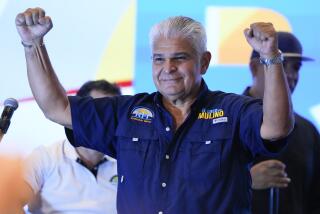Analysis : Fatherly Citizen Pinochet--Strongman’s New Image
- Share via
SANTIAGO, Chile — Gen. Augusto Pinochet is grudgingly trying to trade his image as Chile’s stern, combative dictator for that of citizen and democrat Pinochet, grandfatherly and conciliatory, reaching out to his foes to help build the future together.
To his opponents in the Oct. 5 presidential plebiscite, in which Pinochet is the only candidate, his transformation is calculated, transparent and temporary.
Still, given the government’s overwhelming domination of television, the most important medium in the race, the opposition is not discounting the potential impact of a less truculent Pinochet on the minds of undecided voters. Combined with actions such as lifting state-of-emergency rules and allowing exiles to come home, Pinochet apparently is determined to come across as the protector of democracy--and not its destroyer, as his critics contend.
The 72-year-old general, who seized power in a bloody 1973 coup, by no means hints that the military plans to withdraw from political life in Chile.
To the contrary, Pinochet’s declarations in recent months have not deviated from his traditional position that Chile’s armed forces have a duty to ensure that the country does not again fall under the sway of Chile’s Communist and other Marxist parties, which retain influence here despite the government’s attempts to suppress them.
When Pinochet was nominated by three fellow junta members Tuesday, he wore full uniform, gloves and cape, and his acceptance speech later in the day was more a justification of the 1973 coup--in which Marxist President Salvador Allende died--than a forward-looking vision. His garb seemed fitting for a day when young militants, angered at the nomination, demonstrated and clashed with police in widespread unrest. The opposition said three protesters were shot and killed by government supporters from passing cars.
But a new Pinochet demeanor, evident in recent months on frequent campaign swings, re-emerged dramatically the next night when he unexpectedly spoke to the nation for the first time as the nominee. Two government-controlled television networks canceled scheduled programming to broadcast the address, infuriating the opposition alliance because the campaign does not start by law until Monday, 30 days before the balloting.
Appealing to “the Chilean family” from a soft-hued office, Pinochet declared: “Now is the time for a new democracy, in all its fullness, committed to liberty, progress and justice--a democracy that harmonizes political rights with socioeconomic rights. . . . Here is my promise: to guarantee the effective functioning of democratic institutions.”
The opposition newspaper Fortin Mapocho said that “viewers saw a totally changed Pinochet. Accustomed to seeing an aggressive person, with problems speaking clearly and with a wrinkled frown, viewers instead saw a loving grandfather and an exemplary father speaking with fluidity.”
“They are trying to transform a wolf into a lamb,” Fortin said.
Luis Maira, president of the Socialist Command for the No, said Pinochet spoke against a backdrop of “a photograph of his wife and books that we know he will never get around to reading. . . . The previous day, we saw him in uniform, wild and bellicose, and now we have seen him endowed with this surprising new image, which will last only 35 days.”
Yet the opposition leaders’ harsh reaction seemed to reflect their concern at Pinochet’s political offensive, after their optimism at having stolen the focus of attention from Pinochet on his nomination day.
Word spread Wednesday night that Maria Isabel Allende, daughter of the former president, planned to return defiantly to Chile on Thursday, 15 years after she was sent into forced exile with thousands of other government foes. That could have placed Pinochet in the awkward position of refusing her entry, thus highlighting one of the most criticized of the government’s human rights infringements.
Hours before she arrived, Pinochet lifted all remaining exile orders, allowing more than 400 to return if they choose.
Allende and others sought to portray that as a concession exacted by opposition pressure. But Pinochet had preempted the issue, won applause from the Roman Catholic Church in the process and left the opposition little option but to criticize it as a cosmetic gesture. Furthermore, it opened the door to exiles from the Salvador Allende days whose presence in the country might shift attention from the current authoritarian regime to the memories of the chaotic earlier period, a key Pinochet aim.
The president, still uncomfortable in his new role, grumbled to reporters who asked whether ending forced exile was meant to improve his image: “This isn’t a question of a change of style, but of a person acting in accord with the circumstances.”
More to Read
Sign up for Essential California
The most important California stories and recommendations in your inbox every morning.
You may occasionally receive promotional content from the Los Angeles Times.













